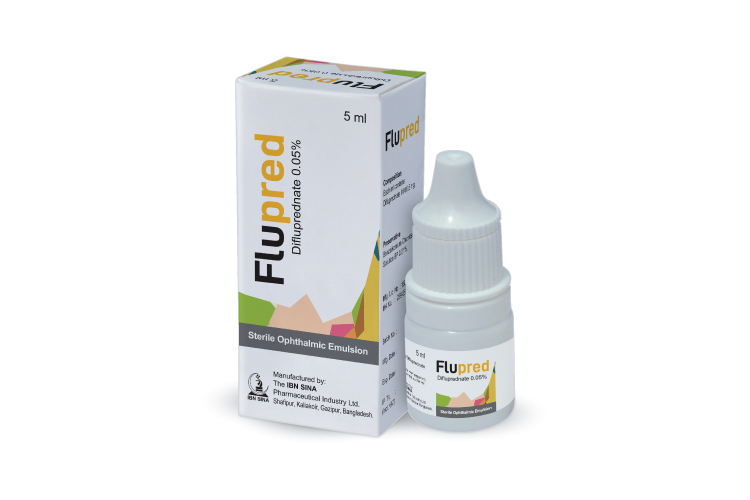
FLUPRED
DIFLUPREDNATE INN
| NAME | STRENGTH | PACK SIZE | DOSAGE FORM |
|---|---|---|---|
| FLUPRED 0.05% W/V | 0.05% W/V | 5 ml | EYE EMULSION |
Flupred Eye Emulsion: Each ml sterile ophthalmic emulsion contains Difluprednate INN 0.5 mg.
Corticosteroids inhibit the inflammatory response to a variety of inciting agents and may delay or slow healing. They inhibit edema, fibrin deposition, capillary dilation, leukocyte migration, capillary proliferation, fibroblast proliferation, deposition of collagen, and scar formation associated with inflammation. There is no generally accepted explanation for the mechanism of action of ocular corticosteroids. However, corticosteroids are thought to act by the induction of phospholipase A2 inhibitory proteins, collectively called lipocortins. It is postulated that these proteins control the biosynthesis of potent mediators of inflammation such as prostaglandins and leukotrienes by inhibiting the release of their common precursor arachidonic acid. Arachidonic acid is released from membrane phospholipids by phospholipase A2. Difluprednate is structurally similar to other corticosteroids.
Difluprednate is indicated for the treatment of inflammation and pain associated with ocular surgery. It is also indicated for the treatment of uveitis, ocular surface diseases, e.g. blepharitis & corneal inflammation.
For post-operative : Instill 1 drop into the conjunctival sac of the affected eye(s) 4 times daily beginning 24 hours after surgery and continuing throughout the first 2 weeks of the postoperative period followed by two times daily for a week.
For uveitis: Instill 1 drop into the conjunctival sac of the affected eyes 4 times daily for 14 day
For blepharitis : Instill 1 drop into the conjunctival sac of the affected eyes 2 times daily for 1 week & then once daily for 1 week.
Difluprednate is contraindicated in most viral diseases of the cornea and conjunctiva, mycobacterial infection of the eye and fungal diseases of ocular structures.
For ophthalmic use only. If this product is used for 10 days or longer, intraocular pressure should be monitored. Fungal infections of the cornea are particularly prone to develop coincidentally with long-term use of steroid topically. Prolonged use of corticosteroids may result in glaucoma with damage to the optic nerve, defects in visual acuity & visual field, and in posterior subcapsular cataract formation. Use of a corticosteroid medication in the treatment of patients with a history of herpes simplex requires great caution
Glaucoma with optic nerve damage, visual acuity & field defects, cataract formation, secondary ocular infection following suppression of host response, and perforation of the globe may occur.
Pregnancy: Pregnancy category C, Use of Difluprednate in pregnancy has not been evaluated. It should be used during pregnancy only if the potential benefit justifies the potential risk to the fetus.
Lactation: It is not known whether Difluprednate passes into breast milk. Caution should be exercised when it is administered to a nursing mother.
Pediatric use: Safety and effectiveness in pediatric patients have not been established.
There are no known drug interactions for difluprednate ophthalmic.
No information provided.
Keep out of reach of children. Store at 15°-25°C & away from light and moisture. Throw away any medication that is outdated or no longer needed.
Flupred Eye Emulsion: Each plastic dropper bottle contains 5 ml sterile eye drops.
